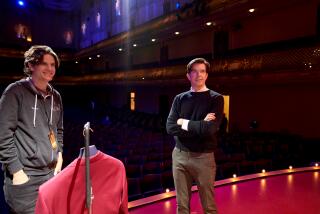Heartland duo’s earnest beat
There’s an axiom describing the fundamental mode of expression that art offers the artist, something to the effect that if you could say it, you wouldn’t have to sing it -- or play, paint, write or sculpt it.
Linford Detweiler, songwriter, instrumentalist and part-time singer for the Ohio duo Over the Rhine, makes a case for the opposite idea: using music to inspire dialogue. It’s a notion he’s been consciously pursuing lately.
“We really took a different tack in 2008 and tried to make our music and our input more about the conversation,” Detweiler said from the farm in rural Ohio he shares with his wife and musical partner in Over the Rhine, singer-songwriter Karin Bergquist. They play the Troubadour in West Hollywood tonight on a short West Coast Christmas tour highlighting songs from last year’s “Snow Angels” seasonal album as well as material from throughout their 20-year career.
“When we saw Al Green play just north of Cincinnati recently, I was looking around the audience and noticing it was about half black, half white, there were some obviously wealthy people, some obviously working class,” he said. “Some people were there because they loved his gospel music, others loved the early R&B; love songs.
“It was this great cross-section of America . . . and I was a little bit stunned as I looked around,” he said. “Ultimately that led me to that sort of slightly higher calling to use music as a way of letting conversation happen that may not happen otherwise.”
The music of Over the Rhine, which takes its name from the Ohio River town, invites conversation through the incisive lyrics Detweiler and Bergquist write and their inspired blend of rootsy Americana music, attention to craftsmanship, offbeat subject matter and forthright philosophy.
The first words heard on the latest of the duo’s dozen studio albums, “The Trumpet Child,” crystallize their attitude about what they do: “I don’t want to waste your time with music you don’t need,” Bergquist sings.
“I don’t want to waste anybody’s time, and I don’t want to waste mine either,” she explained. “We’re always asking ourselves, ‘Is this that last record? Is this the last tour? Is it time to pack it in?’
“It’s healthy to ask that,” she added. “There are countless songwriters, performers and so much good music out there. As long as the world is being nurtured by that, we’re all going to be OK. It doesn’t necessarily mean it has to be my voice or my songs.”
She and Detweiler infused “The Trumpet Child” with a vintage sound filled with trumpets, trombones, saxophones and clarinets as well as an everything-but-the-kitchen-sink approach to back-alley beats. The inventive musical stew reflects their feelings about post-Katrina New Orleans.
“Don’t Wait for Tom,” one of the few songs featuring Detweiler’s singing, is a delightful homage to Tom Waits, one of Detweiler’s early musical heroes. In a low spectral voice against a backdrop that sounds like clanging trash-can lids, he whisper-raps out a vivid portrait of a fascinating character who may or may not be Waits:
He’s got the hands of a blind piano player
He’s got a feel for the dark like a soothsayer
He takes a little bow and tips his fedora
Shouts like he’s gonna save Sodom and Gomorrah
Lyrics that evocative helped land Detweiler and Bergquist on Paste magazine’s list of the 100 greatest living songwriters -- ahead of the members of Pink Floyd and Fleetwood Mac among many others.
They’ve built up a small but devoted fan base that, to their surprise, turned out to include some junior staff members in the Bush administration. That yielded an unexpected invitation from the White House three years ago to visit and talk about the ways that art and politics might mix, similar to conversations the Bush staff had held with the higher-profile likes of Bono and Peter Gabriel.
One indirect result was “If a Song Could Be President,” which closes “The Trumpet Child” on a note of whimsy and wide-eyed optimism:
If a song could be president
We’d hum on election day
The gospel choir would start to sway
And we’d all have a part to play
“It’s one of those songs that goes back to what we were talking about earlier,” Detweiler said. “Maybe we should just get people thinking out loud a little bit, and remembering that in spite of different political affiliations, we share this treasure of music that could only have happened in a messy experiment like America -- music that belongs to all of us.”
--
More to Read
The biggest entertainment stories
Get our big stories about Hollywood, film, television, music, arts, culture and more right in your inbox as soon as they publish.
You may occasionally receive promotional content from the Los Angeles Times.






